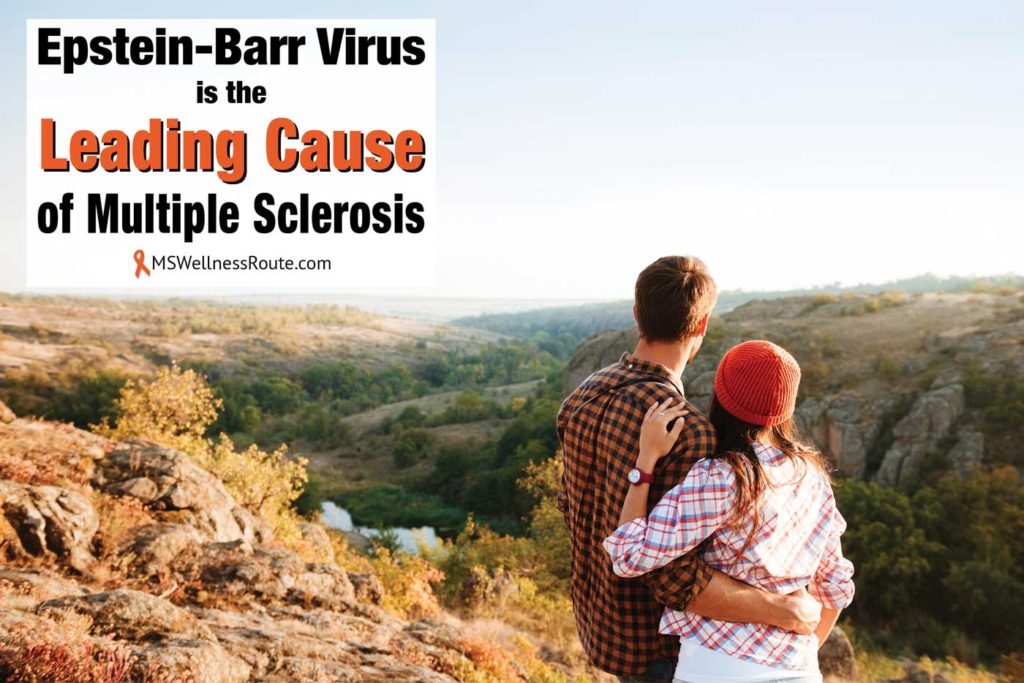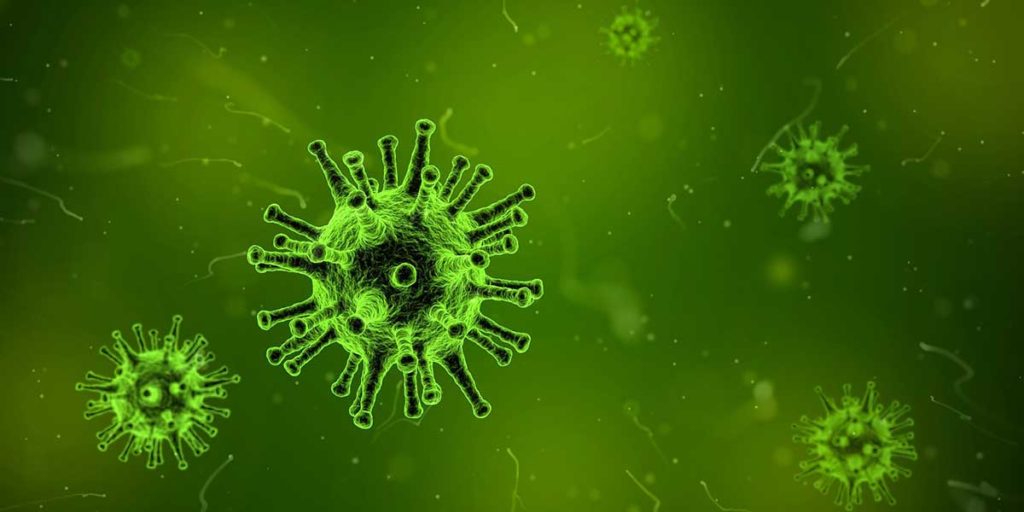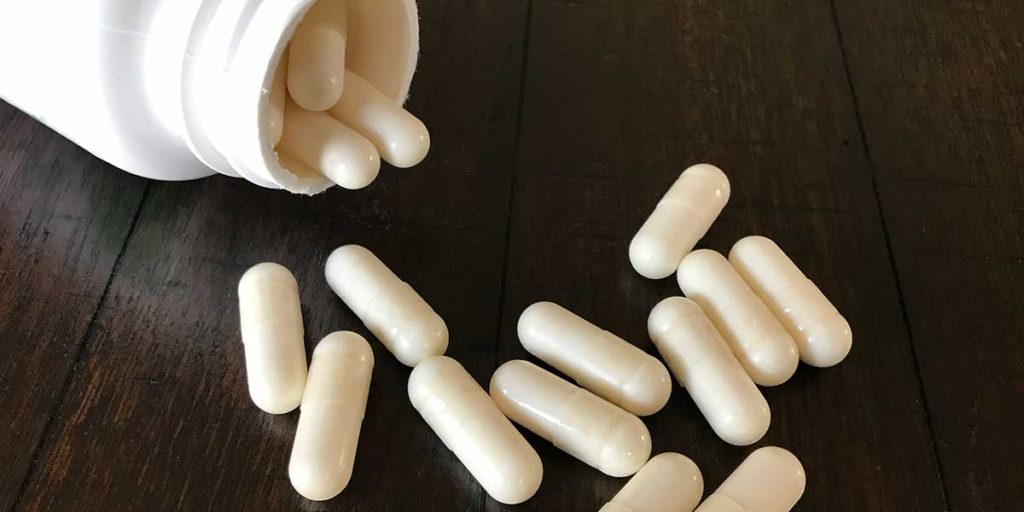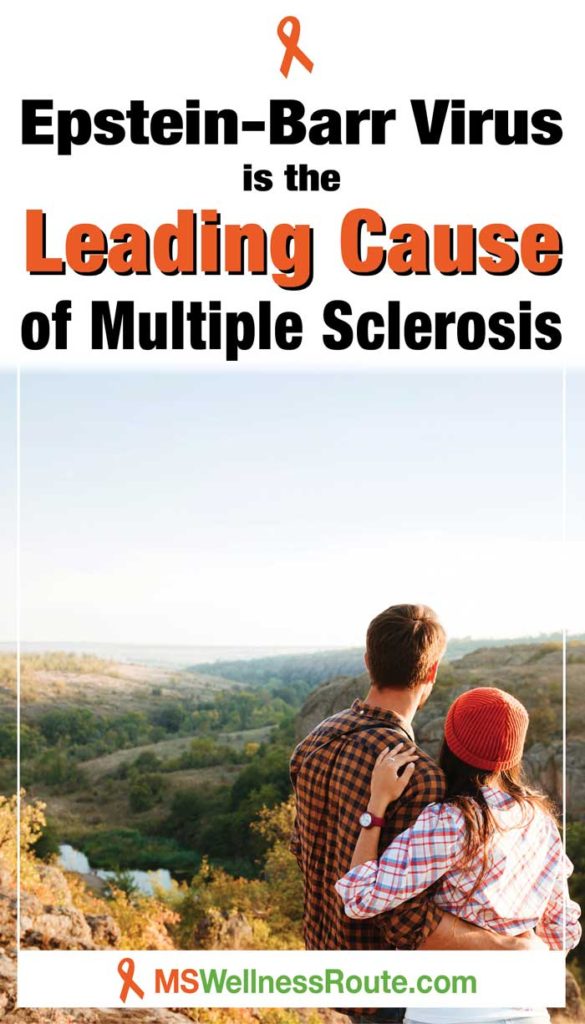Last Updated on November 17, 2023 by Cathy

Multiple sclerosis (MS) is a chronic inflammatory disease of the central nervous system. Nearly one million people in the United States have MS and 2.8 million people worldwide. The Epstein-Barr virus (EBV) has been suspected as a risk to MS for decades, now there is solid evidence.
What is the Epstein-Barr virus?
EBV is in the herpes family, it is one of the most common viruses affecting up to 95 percent of all adults. EBV is easily spread mainly through saliva, which is why it is also known as the “kissing disease.” Although you can also get EBV by sharing drinks or utensils.
Most people get infected with the virus during childhood and are generally asymptomatic. Meaning they don’t know they were infected because they don’t feel sick. If EBV infection occurs when the person is older symptoms may be more apparent. For those who do experience symptoms, it can last 2-4 weeks.
Once infected it stays with you for life, but it is usually not noticeable. It generally stays inactive in the body’s B-cells. Once B-cells cross the blood-brain barrier and enter the CNS, they take part in the development of MS.
Symptoms of EBV include:
- Body aches and pains
- Enlarged liver or spleen
- Fatigue or weakness
- Fever and chills
- Loss of appetite
- Rash
- Sore throat
- Swollen lymph nodes in the neck and/or armpits
An EBV infection prevents the immune cells’ ability to respond to antigens. Possibly increasing the risk of other infections, autoimmune diseases, and cancer.
A blood test can confirm the presence of EBV antibodies. Talk to your doctor about getting tested or use an online lab.
Epstein-Barr Virus and MS

Researchers studied more than 10 million U.S. military personnel between 1993-2013. During that time soldiers had blood samples taken every two years. From these samples, they tested 801 people who developed MS. They then compared these to samples from 1566 people who did not develop MS.
They found a much higher rate of EBV infection among people who developed MS than among controls.
Out of the 801 MS cases, only one person tested negative for EBV before MS onset. Only 57% of the 1566 people who did not develop MS tested positive for EBV. Researchers calculated people with EBV were 32 times more likely to develop MS.
“most MS cases could be prevented by stopping EBV infection.” – Alberto Ascherio, senior author of the study
They explained, “Nearly everyone carries EBV, but only a small fraction develops MS.” This led them to believe other factors are also involved.
“Infection with EBV is likely to be necessary, but not sufficient, to trigger the development of MS.”
They also discovered the onset of MS symptoms begins about 10 years after EBV infection. The delay may be due to the undetected symptoms during the earliest stages.
Things that link MS to EBV infections:
- Nearly everyone with MS tests positive for EBV
- People without EBV don’t get MS
- High levels of EBV antibodies begin before the first signs of MS
- Infectious mononucleosis (mono) doubles the risk for MS
How to Kill Epstein-Barr Virus

Bacterial and viral infections like EBV decrease a person’s vitamin C levels. Since the body does not make vitamin C it must come from food sources or supplements.
Foods high in vitamin C include:
- Berries
- Brussel sprouts
- Broccoli
- Cabbage
- Citrus fruits
- Leafy greens
- Peppers
- Spinach
- Sweet potatoes
- Tomatoes
- Winter squash
Vitamin C is an antioxidant that strengthens the immune system. This is why people often drink orange juice when they get a cold. Vitamin C also protects the brain and spinal cord from free-radical damage.
Studies found high-dose IV vitamin C is effective against EBV. Other studies found high-dose intravenous (IV) vitamin C was effective as a therapy for MS. In high doses, vitamin C can kill bacteria and viruses.
Vitamin C is crucial for restoring the central nervous system function.
Supplementing with Vitamin C

This does not mean you can start taking high doses of vitamin C. Taking high doses can backfire – literally.
Vitamin C is a water-soluble vitamin meaning, it does not store in the body. It is best to take it on an empty stomach. Taking more than the recommended 65 to 90 milligrams (mg) a day will not hurt you. But, doses higher than 2,000 mg a day can cause diarrhea for some people.
It is best to start taking supplements at 1,000 mg a day and work your way up. If you notice your bowel movements starting to get loose then lower your dose. Therapeutic levels for MS range between 3,000 to 6,000 mg (3 to 6 grams) a day.
Always talk to your doctor before taking supplements. Supplements can interfere with certain medications.
When buying supplements make sure it is from a reliable source. I like to use Ascorbic Acid from Thorne and take half first thing in the morning and the other half in the evening. I generally try to space the dose out about 12 hours apart so it stays in my body longer. (Take vitamin C on an empty stomach.)
Powerful Remedies for EBV
Vitamin C isn’t the only option. Other remedies that work very powerfully include colloidal silver, olive leaf extract, and oregano oil. All three are anti-bacterial, anti-fungal, and anti-viral. They not only stop EBV but also stop other conditions such as candida.
You may also want to read The Link Between Candida And MS
Epstein-Barr Virus the Leading Cause of MS
Is EBV the leading cause of MS? Possibly, but it is not the only cause. However, none of the other suspected risk factors for MS have such a strong association with EBV. The next strongest known risk factor for MS is the HLA-DR15 allele gene. It has a three times increased risk for MS.
Although MS does not run in my family, my DNA showed I had a “3 times higher risk.” You can see my DNA sample showing my MS risk in the image below.

To learn more about getting a DNA test read: DNA Test For Multiple Sclerosis
Known risk factors for MS:
- Chlamydia pneumonia
- Epstein-Barr virus (now confirmed)
- HLA-DR15 allele (gene)
- Measles
- Obesity
- Smoking
- Vitamin D deficiency
- X chromosome (males have one X chromosome, females have two – women get MS more often than men)
The existence of another factor that increases the risk of both EBV infection and MS is unknown. Knowing EBV is the leading cause of MS a vaccine for EBV could ultimately prevent or cure MS.
“targeting EBV could lead to the discovery of a cure for MS.” – Alberto Ascherio
This study does not address people who already have MS. Although, a previous Australian study did just this. They tested ten people with secondary and primary progressive MS.
By killing EBV-infected cells seven of the ten participants had improved symptoms. People whose T-cells showed a stronger ability to attack EBV were more likely to improve.
You can boost your immune system by eating and living a healthy lifestyle.

Free Wellness Library!
Subscribe for free and I’ll send you the password to my secret library filled with many printables for your wellness journey.
Want to remember this health tip? Pin it to your Pinterest board!

Image by Arek Socha from Pixabay
Resources:
https://www.science.org/doi/10.1126/science.abj8222
https://www.ncbi.nlm.nih.gov/pmc/articles/PMC4015650/
https://www.nationalmssociety.org/What-is-MS/What-Causes-MS
https://mstrust.org.uk/research/research-updates/181220-cell-therapy-targeting-EBV-progressive-MS





